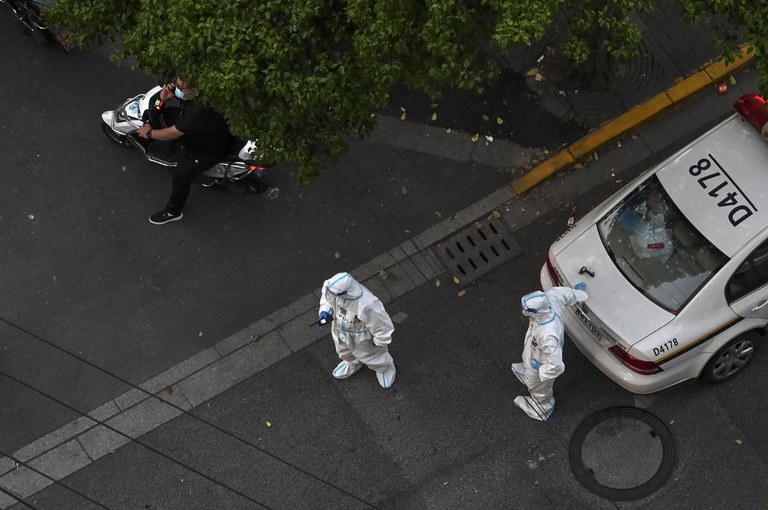Myanmar junta rejects ASEAN outreach to NUG shadow government
Myanmar’s junta on Tuesday poured cold water on calls from Malaysia for Association of Southeast Asian Nations (ASEAN) talks with the National Unity Government (NUG), calling the parallel, civilian administration that opposes military rule “terrorists groups.” Foreign Minister Saifuddin Abdullah last month revealed he’d had contact in mid-February with the shadow government, the first ASEAN country to acknowledge such an interaction. He was responding to calls from ASEAN lawmakers urging the bloc to “immediately and publicly meet with the NUG.” More than a week later the state-run Global New Light of Myanmar quoted the junta’s foreign ministry as saying it “protests and rejects” the Malaysian foreign minister’s remarks, because “they could abet terrorism and violence in the country, hampering the Myanmar Government’s anti-terrorism efforts and infringe international agreements related to combatting terrorism.” The junta, which overthrew Aung San Suu Kyi’s elected government in a coup on Feb. 1, 2021, has branded opponents of military rule as terrorists. The military regime has jailed Aung San Suu Kyi among thousands of political prisoners and killed 1,800 people, mostly anti-coup protesters. “The Ministry cautions the government officials and parliamentarians of Malaysia against making contacts or communicating as well as providing support and assistance to those terrorist groups and their representatives in future,” the junta ministry statement said. Last October, Saifuddin, Malaysia’s outspoken foreign minister had said he would open talks with the NUG if the junta kept stonewalling in cooperating with ASEAN’s conflict resolution efforts. The rebuff to Malaysia came a day after Cambodia’s Foreign Ministry said Prime Minister Hun Sen had urged the Myanmar junta to allow ASEAN’s special envoy to visit and meet deposed leader Aung San Suu Kyi. In a video conference Sunday, Hun Sen called on Snr. Gen. Min Aung Hlaing to allow the meetings and take other steps to implement a five-point agreement the junta leader reached between ASEAN’s foreign ministers in April 2021. Cambodia is the current rotating chair of the 10-nation Association of Southeast Asian Nations, and Hun Sen visited Myanmar in January and met Min Aung Hlaing and urged steps to resolve the political crisis sparked by his coup. Hun Sen requested “further cooperation in facilitating the second visit to Myanmar by the ASEAN Chair’s Special Envoy special chairs envoy, possibly at the end of May,” the ministry said. “He reemphasized the importance of access for the Special Envoy to meet all parties concerned in Myanmar, including Daw Aung San Suu Kyi and former President Win Myint, for creating (a) conducive environment to start an inclusive political dialogue,” the ministry said. Aung San Suu Kyi and Win Myint are in detention and undergoing trial in military courts for what supporters say are politically motivated charges. The Cambodian statement said Min Aung Hlaing had “pledged to facilitate meetings with other parties concerned.” Asked by RFA about Hun Sen’s appeal, junta spokesman Maj. Gen. Zaw Min Tun did not give a definite answer about the envoy meeting with Aung San Suu Kyi, instead focusing on peace talks and meetings with leaders of ethnic groups with longstanding conflicts with the army that pre-date the coup and have little bearing on the current crisis. The previous visit in March to Myanmar by the ASEAN envoy, Cambodian Foreign Minister Prak Sokhonn, “discussed mainly him meeting with the relevant ethnic armed groups on his next visit,” the spokesman said. Little meaningful progress has been made on the five-point agreement, which included an end to violence, the provision of humanitarian assistance, an ASEAN envoy’s appointment, all-party dialogue, and mediation by the envoy. Kyaw Htwe, a senior member of Aung San Suu Kyi’s National League for Democracy, said the ASEAN envoy was not likely to meet the 76-year-old Nobel laureate. “In the current situation, based on the violence they have meted out on the country, I don’t think the military will have the guts to allow Daw Aung San Suu Kyi and U Win Myint to meet with the ASEAN special envoy,” he told RFA. But political analyst Sai Kyi Zin Soe said Min Aung Hlaing might try to “find a way out” of its isolation by granting assess to the detained leader. “He might give the envoy a chance because of the current domestic crisis and his political dilemma, especially when the people and the world are all against him,” he told RFA. Bo Hla Tint, the NUG’s special representative to ASEAN, urged all diplomatic partners to reconsider their approach and talk to the civilian leaders. “We urge the United States and the European Union and the world community to work for a more pragmatic solution through direct coordination with NUG, a nationally recognized government,” he told RFA’s Myanmar Service. “It is clear that efforts to find a solution centered on the ASEAN Five-Point Agreement cannot get any results.” Myanmar will be on the agenda of a May 12-13 summit between the U.S. and leaders of ASEAN, where the White House is keen to advance its vision of a “free and open” Indo-Pacific and discuss efforts to counter Chinese influence. Reported by RFA’s Myanmar Service. Translated by Khin Maung Nyane. Written in English by Paul Eckert.


